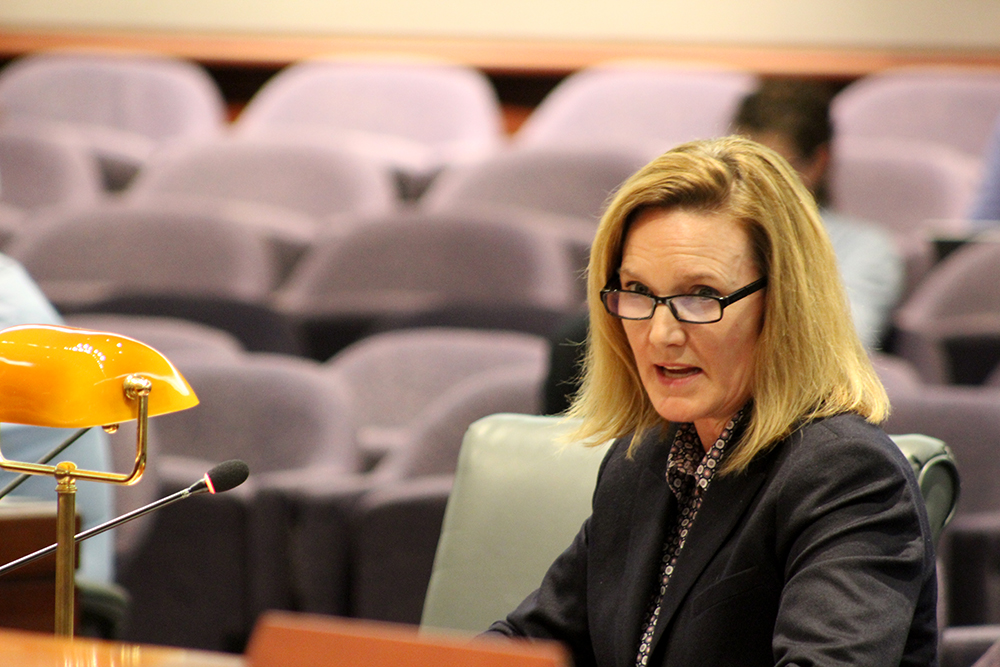

HARTFORD – State Rep. Lezlye Zupkus said the majority party not overturning Governor Dan Malloy’s vetoes to bipartisan legislation shows that they would rather put their party over the people of Connecticut.
Since the end of the legislative session in May, Governor Malloy vetoed seven bills that received overwhelming support from Democrats and Republicans.
Rep. Zupkus said, “Republicans were prepared to override vetoes on important bills to protect education funding and create more manufacturing jobs. It is a shame to see the majority party resort to election-year politics, focusing on national related topics instead of taking action on important legislation right here in our state. We had a chance to continue our bipartisan efforts from the session and stand up to Governor Dan Malloy but it seems the majority party is only concerned about November.”
Here is the full list of bills the majority party failed to override:
PA 18-35 An Act Prohibiting the Executive Branch From Making Rescissions Or Other Reductions To The Education Cost Sharing Grant During The Fiscal Year
Prohibits the governor from cutting education cost sharing (ECS) aid grants to towns by (1) using his rescission authority to reduce allotment requisitions or allotments in force or (2) making reductions in allotments in any budgeted agency to achieve General Fund budget savings.
PA 18-80 – An Act Extending the Manufacturing Apprenticeship Tax Credit to Pass-Through Entities
This act extends the manufacturing apprenticeship tax credit to the personal income tax, thus
allowing the owners and partners of qualifying companies organized as partnerships, limited liability
companies, and other pass-through entities to claim the credit against that tax.
PA 18-89 – An Act Concerning Classroom Safety and Disruptive Behavior
This act requires boards of education, as well as the State Department of Education, to address
daily classroom safety as an additional part of the law requiring them to address bullying and teen
dating violence.
PA 18-119 – An Act Concerning Election Day Registration Locations
Prior law required registrars of voters to designate a location within each municipality for
completing and processing Election Day registration applications. This act requires town clerks to
designate a location if the registrars of voters fail to agree on one at least 31 days before the
election.
PA 18-140 – An Act Establishing the State Oversight Council on Children and Families
This act renames the State Advisory Council on Children and Families as the State Oversight
Council on Children and Families and increases its membership from 19 to 25. It replaces 13
members appointed by the governor with 12 members appointed by legislative leaders and one
member appointed by the Juvenile Justice Policy and Oversight Committee chairpersons. It also
adds (1) the Children’s Committee chairpersons and ranking members, the child advocate, and the
chief public defender, or their designees, to the council and (2) certain required qualifications for
the six members who represent regional advisory councils.
The act also expands and modifies the council’s duties, including requiring it to monitor, track, and
evaluate the Department of Children and Families’ (DCF) policies and practices related to child and
youth safety, permanency, and well-being.
PA 18-156 – An Act Concerning an Animal Abuse Registry
This act requires the Department of Emergency Services and Public Protection to create and
maintain, within available appropriations, a publicly-available registry of individuals who are
convicted, or found not guilty by reason of mental disease or defect, of certain animal abuse
crimes.
PA 18-157 – An Act Concerning State Contract Assistance Provided To Certain Municipalities
This act imposes several new conditions and requirements on state financial assistance to repay
bonds and other debt for designated tier III and IV municipalities (i.e., those with higher degrees of financial distress and state oversight and control).
###
